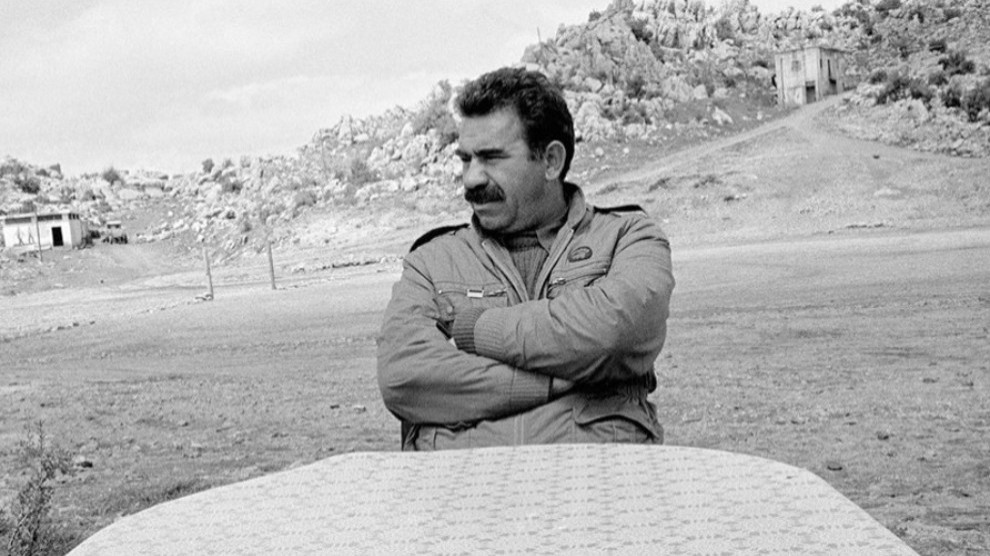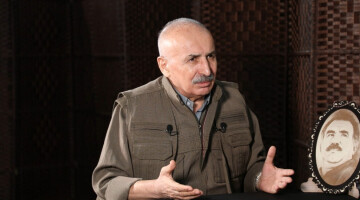The book The Sociology of Freedom: Manifesto of the Democratic Civilization, Volume III, written by Abdullah Öcalan and translated by Havin Guneser, will be published by PM Press.
Here we publish an excerpt called Society’s Industrialism Problem :
The Industrial Revolution, which was as important as the agricultural revolution, has carried on with ups and downs, experiencing a qualitative leap in the late eighteenth and early nineteenth centuries, based on thousands of years of accumulation. It is impossible to guess where, when, and how it will stop or be stopped. This revolution has a characteristic akin to analytical reason; it is, in fact, the product of this reason. And it is under the absolute domination of capital. There is no doubt, however, capital itself is not the creator of most industrial tools. However, capital has focused on turning them into profitable tools and taken possession of those it considers essential. Cheap mass production offers a major opportunity for the development of society. As with reason, industry that served society’s needs would be valuable. The problem is not with industry itself but with the way it is used. Industry is like the nuclear option. When it is used by the monopolies it can be an unparalleled threat to life, portending both ecological disaster and war. Indeed, its use for making profit has become increasingly evident, accelerating environmental destruction. Industry is rapidly moving society toward virtual society. Humans are increasingly being replaced by robotics. If this continues, it will not be long before humans themselves are redundant.
There is consensus that the current state of the environment not only threatens society but all life on earth. I must emphatically stress that holding industry solely responsible for this would be an aberration. On its own, industry is neutral. An industry in harmony with society’s existence can play a decisive role in developing the world into a third nature, not only for humans but for all lifeforms. It is possible, and if it were the case, we might even consider industry a blessing. But when industry is controlled by capital and is profit-driven, it can make the world hell for all of humanity except a handful of monopolists. In fact, that seems pretty much to be our current situation. Humanity is undeniably extremely alarmed by the current course of events. The industrial monopoly has established genuine empires ruling over society. For a single US hegemon, there are tens of industrial hegemons. Even if political and military hegemons could be stopped, the industrial hegemons couldn’t be easily halted, because they are now global. If a country serving as the center begins to become precarious, then another location and/or country can be turned into the center. Who is to say that one of the US’s industrial empires won’t choose China as its center tomorrow? Why not, if the conditions are more suitable? We can see that this is gradually becoming an option.
Industrialism shot agriculture in the heart. Agriculture, a necessity if human society is to exist, faces rampant destruction at the hands of industry. This sacred activity, which has nurtured humanity for the past fifteen thousand years, was left adrift, and preparations are now being made to turn it over to industrial domination. Contrary to popular opinion, the involvement of profit and capital driven industry in agriculture is not an opportunity for mass production. The industrial monopolies’ use of genetically modified seeds is making the soil like a mother bearing a child by artificial insemination. Just as healthy pregnancy and maternity are not possible through all kinds of artificial intervention, it is also not healthy to inseminate the soil with genetically modified seeds. Industrial monopolies are preparing to engage in just such madness in relation to agriculture. Humanity will, and has even begun to, experience its worst counterrevolution in the agricultural area. The soil and agriculture are not just any mode of production or relationship; they are inseparable existential aspects of society that cannot to be tampered with. Human society is primarily built on the basis of the soil and agriculture. Detaching it from this space and production would be a huge blow to its existence. The cancerous growth of the cities has already begun to clearly exhibit this danger. Liberation would probably largely mean moving in the opposite direction: from the city back to the soil and agriculture. I imagine the main slogan of this movement would be something like: “Either agriculture and soil for existence or extinction.” The drive for profit and capital do not allow for industry to unite with the soil and agriculture and link them together by a friendly and symbiotic relationship but instead piles up enormous contradictions and creates hostility between them.
The class, ethnic, national, and ideological contradictions within society may lead to conflict and war, but they are not impossible to resolve. They are constructed by the human hand and they can be dismantled by the human hand. However, humans cannot keep the conflict between industry, and the soil and agriculture under control, because industry is the tool of capital. The soil and agriculture arose ecologically over millions of years. If they degenerate they cannot be reconstructed by the human hand. Just as manufacturing soil is impossible, agricultural prod- ucts or other living beings, including plants, are not likely to be created by humans at this point. This is not something we can expect. This potential has been fulfilled in the realization of the human being. It is neither meaningful nor possible to repeat what has already occurred. This is a profound philosophical issue, so I won’t delve into it too deeply here.
However, just as the pharaohs tried unsuccessfully to prepare for the future with their pyramidic mausoleums, industrialism will also prove unable to create a future where life is worth living with its robotization. Its very approach is disrespectful to human beings. With so magnificent an entity as nature, how meaningful and important can robots or copies of the natural world possibly be? We are once again confronted with capital’s mad drive for profit. Let us assume that robots offer the cheapest form of production. If there are no humans to use them, what good would they be? This aspect of industrialism is the main source of unemployment and is capital’s major weapon against society’s productivity. Capital uses industry as a weapon to manipulate the market both by employing the fewest possible workers and by enforcing price cuts. Monopolistic prices cause crises (of overproduction)—the main factor behind unemployment. Rotting goods and millions of unemployed, starving, and poor people are the victims of these crises.
Social nature can only be sustained by a tight connection with the environment, which is the product of millions of years and a favorable setting. No industrial creation can replace the environment, which is the fantastic creation of the universe. Land, air, sea, and space traffic have already reached disastrous levels. Industry constantly consumes fossil fuels, poisoning the environment and undermining the climate. The payoff for these disasters is a mere two hundred years of profit accumulation. Is this accumulation worth all the destruction, which is far greater than the sum of the destruction rendered in all of history’s wars, with the loss of lives greater than the sum of total of lives previously lost to human violence, natural disasters, and all other causes?
Industrialism, as a monopolistic ideology and tool, is one of society’s fundamental problems. It should be deeply questioned, and the danger it gives rise to is sufficient reason to do so. If this monster continues to grow and gets out of control, it will make any examination and possible safeguards “too little, too late.” If we are to prevent society from ceasing to be itself and becoming a virtual society, now is the time to take this monster from the hands of monopolies, first to make it harmless, and then to make it a friend of society.
As we struggle against industrialism, there is a need to distinguish between monopoly’s ideological approach to industrial technology and the way it is currently used and a form of industrial technology that is in harmony with the general interests of society. This is the most important aspect of any scientific work done and of any ideological struggle. Groups that claim to struggle against industrialism as humanists (philanthropists) independent of social and class issues cannot be expected to produce anything relevant. These groups cannot avoid coming into conflict with their own goals and ultimately rendering a service to industrialism as a monopoly. Contrary to popular belief, industrialism has an ideological, militaristic, and class-based character, with science and technology as the material form of its ideology. In fact, it represents the most dangerous dimensions of existing science and technology. The industrial monster did not appear entirely of its own volition. Let’s remember that when the English bourgeoisie embarked on its historical imperialist project on the island, on continental Europe, and around the world, it was this class that organized most quickly to make the most comprehensive possible use of industrialism. Later industrialism became a common weapon of the bourgeoisie in every country. This is evident given that bourgeois domination around the world materialized at the point where industrial development—part of the triad of finance, trade, and industry—marked the nineteenth and twentieth centuries.
By declaring noncapitalist society reactionary and entering a strategic alliance with the industrial bourgeoisie the real socialist movement unconsciously but completely contradicted its own goals, leading to a more tragic outcome than that experienced by any other movement that has objectively fallen into betrayal. One example would be Christianity, which was a religion of peace for three hundred years, and then entered into an alliance with power and the state, leading it to objectively, and for the most part consciously, contradict and betray its own goals. The point is that Christianity also came into conflict with its initial goal, because it gravitated toward the monopoly of power and, as a result, could not escape becoming a civilization religion. In Islam, this happened while Mohammad was still alive. In the end, they all ultimately succumbed to the power industry.
While today all of humanity is crying out against environmental destruction, as if the judgment day were near, it is important to understand the historical, social, and class dimensions of the devastation caused by industrialism in the light of similar movements, to take up the struggle against industrialism as a society’s movement of existence, and to inevitably wage a struggle in the style of a new sacred religious movement. Just as it is impossible to fight fire with fire, life lived in the swamp of industrialism must be questioned and abandoned if we are to wage an ecological struggle. If we do not wish to live new tragedies like those of Christianity, Islam, and real socialism, then we need to learn the lessons they offer and approach scientific-ideological and moral-political struggle correctly.














